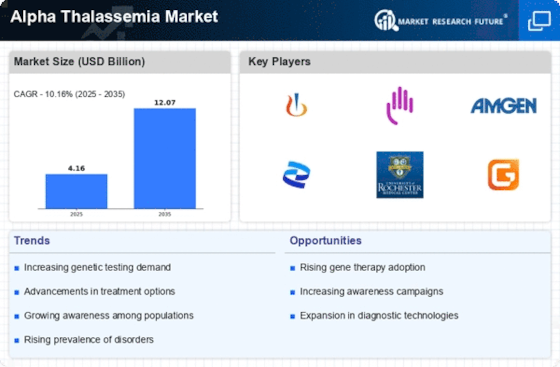Market Share
Alpha Thalassemia Market Share Analysis
The Alpha Thalassemia Market targets a hereditary blood condition that causes insufficient alpha-globin chain synthesis. Companies in this niche industry use a variety of tactics to gain market share in alpha thalassemia diagnostic and treatment. A main approach is using modern genetic testing tools. Companies invest in DNA sequencing and molecular diagnostics to improve alpha thalassemia diagnosis. Keeping up with technology gives you a competitive advantage and helps discover problems early. Strategic partnerships with hematologists and genetic counselors are crucial. Partnerships with industry leaders help spread the company's alpha thalassemia diagnostic and treatment solutions. Strong specialized partnerships boost market reputation and consumer base. Companies prioritize gene therapy and genetic modification since alpha thalassemia is hereditary. Novel gene-editing tools and medicines to fix genetic mutations are being studied. Offering novel, possibly curative treatments boosts market attractiveness and impacts prescription. Educational programs for people and healthcare workers must be actively participated in. Information on alpha thalassemia, its genetics, symptoms, and therapies raises awareness. Physician education on alpha thalassemia management difficulties increases acceptance and market share. Clinical studies and strict regulatory criteria are essential in the alpha thalassemia business. Companies emphasize approvals and clinical research to prove gene therapy and treatment options are safe and effective. Clinical trial compliance and participation increase trust and market position. Alpha thalassemia genetic counseling via telemedicine is a modern approach. Companies provide virtual genetic counselor appointments so patients may get professional assistance regardless of location. This technique follows the telemedicine trend and enhances patient access to vital counseling services. Alpha thalassemia marketing initiatives must emphasize early identification and intervention. Companies target the public and healthcare professionals with awareness campaigns. Promoting early diagnosis improves market perception and managerial success. Providing affordable alpha thalassemia genetic therapy is important. For competitive pricing, companies improve production processes, negotiate with suppliers, and use economies of scale. This technique attracts healthcare professionals and institutions seeking trustworthy and affordable alpha thalassemia genetic therapy. Continuous healthcare practitioner training is essential. Companies educate physicians on the latest genetic therapies and alpha thalassemia management methods through workshops, webinars, and training materials. Well-trained healthcare practitioners promote the company's goods, encouraging market uptake. Creating patient advocacy and support organizations is proactive. Company platforms provide information, resources, and emotional support to alpha thalassemia patients and family. This devotion to patient well-being boosts market image and loyalty.



















Leave a Comment